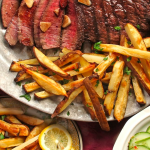Psoriasis is a chronic skin condition that causes a rash with itchy and scaly patches on the elbows, trunk, knees, and scalp.
It’s an autoimmune condition in which the body’s immune system attacks the normal skin proteins. As a result, there is an increased turnover of the proteins — that is, proteins die, and new proteins are formed quicker than usual. Old proteins accumulate to form plaques and cause itching and a rash.
There is no absolute cure for psoriasis, but the disease is managed symptomatically. Treatment aims to alleviate symptoms, and diet plays a crucial role in the palliative treatment of psoriasis.
Here we explain the science behind how the carnivore diet can treat psoriasis.
TABLE OF CONTENTS
Can You Treat Psoriasis With Your Diet?

The role of foods on psoriasis is debatable. A theory postulates that some of the non-protein amino acids present in plants are harmful to human beings and can result in various autoimmune disorders, including psoriasis.
Though this theory is controversial, it is widely acknowledged that some foods trigger and worsen psoriasis.
Avoid Gluten at all Costs
Gluten needs a special mention here as it exacerbates inflammatory processes in predisposed individuals, worsening the disease process. You must go for a diet that is Gluten or carb-free.
Some evidence has disclosed the potential of the carnivore diet in treating psoriasis symptoms. Being a total plant and gluten-free diet, the carnivore diet helps reduce psoriasis symptoms.
Eat Lean Protein from Fish
Lean proteins can be beneficial for psoriasis. These are present in white-fleshed fish — 100g of which give almost 30g of lean protein. Some examples of these fish are cod, haddock, grouper, halibut, tilapia, and bass.
Fish are essential in other ways too for those with psoriasis. They provide omega-3 fatty acids, including alpha-linolenic acid (ALA), eicosapentaenoic acid (EPA), and docosahexaenoic acid (DHA). These omega-3 amino acids are anti-inflammatory and can stop or alleviate the symptoms.
Fish also contain selenium, another anti-inflammatory substance that has gained importance in the recent past among research on the role of food and nutrients on psoriasis. It plays its role in forming an antioxidant, glutathione peroxidase (GPx). GPx helps in the destruction of free radicals, which cause inflammation. As a result, itching and rashes can be reduced.
Besides fish, selenium is also found in egg and dairy products to some extent.
Get Vitamin A and Vitamin D
The active form of vitamin A is retinoic acid (RA), which stops the excess production of skin cells. Vitamin A can be used with caution in psoriasis. Livers, eggs, fish, and dairy products are good carnivorous sources of vitamin A. Fish, shellfish, and liver are also good sources of vitamin B12, an anti-inflammatory agent.
Another noteworthy nutrient is vitamin D. Research has shown that vitamin D benefits psoriasis. Cod liver oil, swordfish, salmon, tuna, sardines, egg, or cheese can be good sources of vitamin D.
It needs to be specially mentioned here that it is advised that people with psoriasis should avoid foods with high fatty acids contents. While chasing high-fat meat such as beef or pork, go for lean cuts. Avoid animal fat as far as possible. Fatty meat is usually considered pro-inflammatory and is thought to worsen the disease.
Can the Carnivore Diet Help Treat Psoriasis?
In short, although there are no studies on the carnivore diet and psoriasis, all research about psoriasis shows that carnivore-diet foods can help this condition.
There are also many carnivore diet skin before and after photos of people who healed their psoriasis using this diet.
Eat lots of lean protein from fish, eat a list of organ meats such as beef liver, and get vitamin D from eggs and cheese. Be careful eating fatty cuts of meat and doing a strict carnivore diet. To get energy, you could opt for a higher-carbohydrate carnivore diet with fruit instead.
Learn more about:
- Carnivore diet and arthritis
- Carnivore diet and erectile dysfunction
- Carnivore diet and hair loss
- Carnivore diet for IBS
- Carnivore diet and inflammation
- Carnivore diet and insomnia
- Carnivore diet and kidney stones
- Carnivore diet and menopause
- Carnivore diet and multiple sclerosis
- Carnivore diet and rosacea
- Carnivore diet for SIBO









Leave a Reply